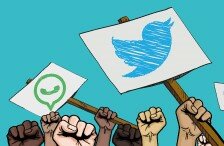How much has Social Media increased political participation in young people, how useful is it if it isn’t ‘legitimate’?
By Sara Khaliq
In the UK there is increasing polarisation in the lines of age and their input in political participation. Like in every democracy, it is vital for every sector of society to be able to cast a vote that matters. In the case of young people however, it seems that a different method of integrating into political processes is preferable, social media.
In 2010, 44% of people aged between 18-24 turned out to vote in the general election. In 2017, this had increased by a rather meagre 2%. There is very little correlation between young peoples votes and the political landscape at the time, or how ‘formal participation’ coincides with social media utilisation. Despite this, it is undisputable that social media is a driving force that creates awareness of political processes.
The average response, to such as assertion is often, ‘yes social media can create higher levels of engagement with politics, but what does this matter if it has no concrete impact?’. It is because the effects of social media in politics cannot be measured, that the above rhetoric is widely accepted. However, one cannot deny that social media can transcend class, racial, and age lines more than formal methods of political participation ever has. Even if this is merely awareness created by sharing a ridiculing meme, a petition, or a video with a ‘Gen Z’ take on a political affair, these are all tools that politically engage more of the electorate than going to a voting station or lobbying MP’s.
Gen Z has become a part of a new system that utilises social media in an unprecedented manner, that is not to say that there are not dangers with such use. But to refer back to the weighted argument that social media sharing does not equate with actual impact, I ask which ‘politically endorsed’ methods do? If anything, it can be argued that years of governments failures to listen to the people has been a vital precondition of more unconventional methods of participation. Perhaps the critics that argue of the dangers of social media, should also argue that there are fundamental flaws in the use of direct democracy that should also be challenged. In the increasingly digitalised world, social media is a hallmark that cannot be erased. Therefore, it would make sense to embrace social media as an information sharing tool, in reality, however, this would not be a coherent blog if I did not acknowledge the dangers that social media can pose in the hands of a few.
Social media can act as a mouthpiece for hate speech, extremist ideals, and misinformation for groups to gain a vocal stronghold. The existence of conspiracy theories in political discourse is a significant danger as they can give prominence to falsified concepts that ultimately undermine the life of democracy. Whilst there are regulations enforced by social media giants, it is beyond any one corporations’ control how individuals use their platforms. In the heights of political volatility, it is increasingly necessary, if not vital for the developers of social media to take precautionary measures to monitor what is being virally shared on their platforms. That being said, as mentioned previously, social media is a part of everyday life, its benefits therefore, should not be easily washed over just because it’s use does not conform to standard political methodology.
I would like to pose a final question, is it more beneficial to have some form of political engagement with the masses, even if it not legitimate, than none at all?


